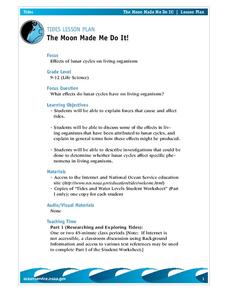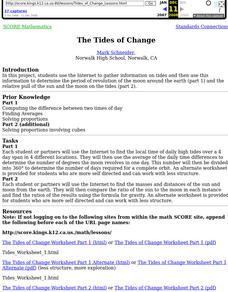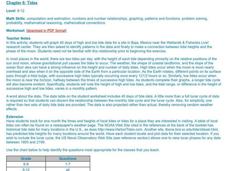Curated OER
Tides & Lunar Cycles
Students demonstrate how the moon affects the tides, a neap tide, and spring tides by using their bodies as models. After students observe the model they created, they draw and label the diagram on a provided worksheet. They then log...
Columbus City Schools
Totally Tides
Surf's up, big kahunas! How do surfers know when the big waves will appear? They use science! Over the course of five days, dive in to the inner workings of tidal waves and learn to predict sea levels with the moon as your guide.
Curated OER
Astronomy - Sun, Moon, Tides
Colorful in appearance, but without any photos or graphics, this PowerPoint is best used as a note-taking guide for your lecture. Viewers in your earth science class will discover characteristics and phases of the moon, its role in...
Curated OER
The Moon Made Me Do It!
Students research about how lunar cycles affect living organisms. In this biology lesson, students prepare an oral presentation of their research results and analyses. They explore the forces that affect tides.
Curated OER
Tide Types
Young scholars record hourly reading for water height for 24 hours and determine whether a location experiences diurnal, semi-diurnal or mixed tides. Links are present for the information. Students predict high and low tide, and answer a...
Curated OER
Tides, Eclipses, Day and Night, and Seasons
In this earth science learning exercise, students use the clues given at the bottom of the sheet to complete the crossword puzzle on tides, eclipses, day and night, and the seasons of the year. There are 17 clues to solve in the puzzle.
Curated OER
The Moon Made Me Do It!
Students research lunar cycles and how it effects living organisms. In this investigative lesson students prepare written reports on the lunar cycles and the relationship between animal behavior and reproductivity then give an oral...
Curated OER
Tides of Change
Students use the Internet to gather information on tides and then use this information to determine the period of revolution of the moon around the earth (part 1) and the relative pull of the sun and the moon on the tides (part 2).
Curated OER
Tides
Young scholars graph 40 days of high and low tide data for a site in Baja, Mexico near the Wetlands & Fisheries Live! research center. They identify patterns in the data and finally to make a connection between tidal heights and the...
Curated OER
Regents High School Examination: Physical Setting Earth Science 2006
Test your class on earth science with this extensive resource. This test, created by The University of the State of New York Regents, is made up of 50 multiple choice questions and 32 short answer questions that cover the branches of...
Mr. E. Science
The Earth in Space
Do you think Earth makes fun of other planets for having no life? The presentation covers the rotation and revolution of both the earth and our moon. It provides explanations for seasons, tides, and eclipses. Lesson is the 20th in a...
Curated OER
The Tides-Ups and Downs
Students investigate tidal patters and the forces that cause the tides. In this tidal lesson plan, students explore and research the tides and complete 43 questions about the causes of the tides, how they are monitored and measured and...
Curated OER
Rocky Intertidal Field Trip
Students investigate tides and the land submerged under them. In this intertidal field trip, Students visit the intertidal zone and observe the habitats and animals that live there. Students view the pools under rocks where...
Columbus City Schools
Experiencing Eclipses
Don't be caught in the dark! Young scientists investigate the causes of both solar and lunar eclipses using an interactive to help them understand the development of an eclipse over time. They then research facts and characteristics...
Curated OER
The Earth-Moon System
In this Earth and moon worksheet, students will review the different phases of the moon, how eclipses are created, and how the moon influences tidal patterns. This worksheet has 13 fill in the blank, 8 true or false, and 2 short answer...
Glynn County School System
The Moon
People may not be able to jump over the moon, but scientists can still study it! The moon is covered with mons (mountains) and mars (seas). Aspiring astrologists learn about the moon's features and phases in a PowerPoint presentation. In...
Curated OER
Moon
Students discover scientific facts about the Moon and how
some American Indian Tribes used the moon to measure time.
They accomplish this by listening to stories and poetry, writing
stories, communicating with an astronaut,...
Curated OER
The Phases of the Moon
Learners sketch the different phases of the moon after exploring them on an internet program. In this moon phases lesson plan, students discuss how the Sun, Earth, and Moon are related.
Curated OER
Once in a Blue Moon
Third graders identify the phases of the moon. They use technology to access websites on the Internet dealing with the moon.
Curated OER
The Earth in Space
Students use computer images to explain why the Earth has seasons and examine the phases of the moon. They create 3-D images and present them to the class. They answer a series of questions at the end of the lesson.
Curated OER
Simple Machines: The Wede & Lever
Students describe how wedge and lever makes work easier. In this physics lesson plan, students analyze experimental data by creating a graph to see the trends. They calculate the work done and mechanical advantage of these simple machines.
Curated OER
The Moon Orbits the Sun?!?!
Students calculate the strength of gravitational force exerted on the moon by the sun and earth. In this orbital activity students view a demonstration to see the gravitational forces between bodies.
Curated OER
Charting Seasonal Changes
Students research the Earth's patterns of rotation and revolution, create a chart and graph of these patterns and use them to explain the causes of night and day and summer and winter.
Curated OER
Chemical and Physical Changes
Eighth graders investigate different gas behaviors. In this chemistry lesson plan, 8th graders describe how changing volume and temperature affect gas particles motion. They collect data and make a generalization about these variables'...

























